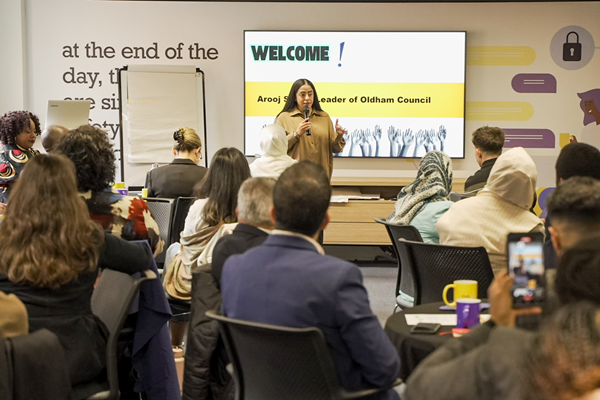
Independent commission sets challenge to put wellbeing and equality at the heart of everything
- Greater Manchester Independent Inequalities Commission publishes recommendations for tackling the causes and drivers of inequality
- Commission calls for equality and wellbeing goals to be put at the heart of public policy and across the private and voluntary sectors
- Recommendations include strengthening equality panels, community wealth and investment initiatives, and a living wage city-region by 2030
AN independent commission formed to explore inequality and injustice across Greater Manchester has set out a range of measures for tackling disparities and transforming public policy.
The Independent Inequalities Commission was launched in October 2020 with a six-month mission to examine inequalities across the city-region, consider how they should be tackled and outline specific, ambitious recommendations.
Their findings highlight a range of progressive actions already being taken in Greater Manchester and elsewhere and consider how they can be embedded within public service delivery at all levels, responding to the immediate challenges of the pandemic and pivoting towards new ways of doing things in the future.
The Commission is calling for wellbeing and equality goals to be put at the heart of the Greater Manchester Strategy, with public budgets and projects all geared towards redressing imbalances by building a strong economy and working with residents to deliver the best possible services.
Recommendations include strengthening the mandate of equalities panels, establishing an independent Anti-Discrimination body, working with education and training providers to bridge the skills divide, and community wealth building and investment initiatives. They also call for a target of 2030 being set for every employer in Greater Manchester to pay a living wage and offer living hours to employees.
During their six-month investigation the Commission took stock of existing evidence and good practice, engaging with stakeholders in the business, public, voluntary and community sectors.
This included the collaborative work between Greater Manchester Health and Social Care Partnership and the Marmot Team at the Institute of Health Equity at University College London to develop Greater Manchester as the UK’s first Marmot city region, ensuring that policies and resources are geared towards creating a fairer, more equal society. The analysis and recommendations from the collaboration will be published in spring 2021 and will support ongoing conversations in Greater Manchester around inequalities in light of the COVID-19 pandemic.
The Independent Inequalities Commission was chaired by Prof Kate Pickett, Professor of Epidemiology and Deputy Director of the Centre for Future Health at the University of York. Also serving on the Commission were:
- Saeed Atcha MBE DL, Deputy Lieutenant of Greater Manchester and Government Social Mobility Commissioner
- Miatta Fahnbulleh, Chief Executive of the New Economics Foundation
- Ruth Lupton, researcher and Honorary Professor at the University of Manchester
- Neil McInroy, CEO of the Centre for Local Economic Strategies (CLES)
- Andy Westwood, Professor of Government Practice and Vice Dean Faculty of Humanities, University of Manchester, and Associate Partner at Public First
- Lord Simon Woolley, Director and Founder of Operation Black Vote
Andy Burnham, Mayor of Greater Manchester, said: “The past year has brought out the very best of us in the darkest of times. But the pandemic has also brutally exposed how unequal our society has become.
“We have seen like never before the blunt reality that precarious employment and poor housing is damaging the health of far too many of our residents. We have winced at the deep scars caused by racism and discrimination. The challenge now is to face up to these issues, understand how they overlap, and bring about systemic change.
“I want to thank all of the Commissioners for bringing such insight, diligence and commitment to this task. They have made a set of challenging but practical recommendations. It’s up to all of us to take those ideas forward and make sure we bring those benefits to everyone.
“Building Back Better will become the next empty slogan unless it deals directly with the inequalities exposed by the pandemic. It needs to be about delivering better jobs, better homes and better health for all of our residents and it needs to start in communities hit hardest by COVID. That is what we will seek to do in Greater Manchester guided by the Commission’s ideas.”
Cllr Brenda Warrington, GMCA Lead for Equalities, said: “The Independent Inequalities Commission has shone a light on the vast amount of good work already being done in many areas across our city-region, and we are grateful to Prof Kate Pickett and her colleagues for their dedication to this exercise.
“We’ve always been guided by a strong commitment to equality and wellbeing, and the challenge for us now is to make sure these principles are woven into the fabric of every strategy, every initiative, and every partnership we undertake. Our equalities panels and the groups with which we work will play a vital role in this process.”
Prof Kate Pickett, Chair of the Independent Inequalities Commission, said: “The Commission applauds Greater Manchester for breaking new ground in its ambition to tackle the root causes of inequalities and create good lives for everyone.
“Our report sets out a vision for the city-region, outlines actions that can be taken now, and provides inspiration for a fairer future. We hope that our proposals will take Greater Manchester to the next level in creating a good life for all.”
Visit www.greatermanchester-ca.gov.uk/inequalities to find out more.
Article Published: 25/03/2021 17:42 PM



